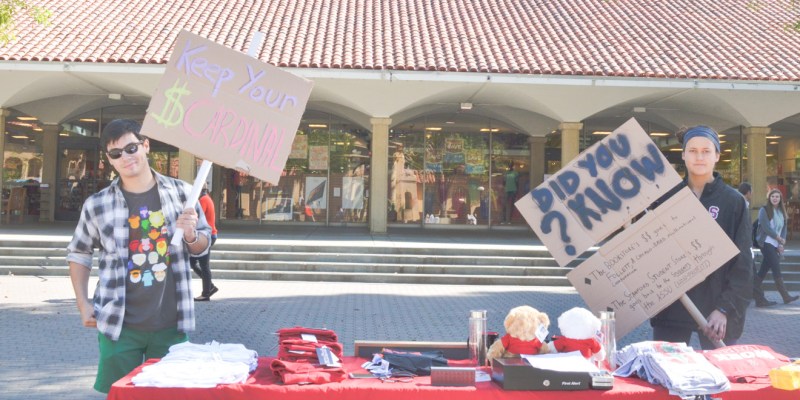The Stanford Student Store set up shop on Friday facing the Stanford Bookstore with cardboard signs jokingly calling for “divestment” from the Bookstore.
Poking fun at the fact that divestment has become a conversation piece around campus, the promotion was advertised on a Facebook event page as a “protest” aiming to “fight corporate exploitation” and was accompanied by a video.
“Stanford, it’s time to take a stand and take meaningful action against these horrible corporations, who are ruining our beautiful campus,” said the tree-hugging character played by Jeremy Gilfor ’15 in the video. “Why not look to a beacon of hope in these trying times?… Don’t let the fat cats get fatter.”
Andrew Gronda ’15, the Student Store’s general manager, explained that the event’s purpose was twofold.
“The whole divest thing that we’re doing now is basically just latching on to the common discourse that’s going on around school to try to push one of the selling points that we’ve always had, which is the difference in the revenue streams of the Student Store and the Bookstore,” Gronda said. “We tried to do it in a way that’s not pushing any buttons, and that gained a little bit of attention.”
The Student Store’s profits are directly reinvested into student life via the Stanford Student Enterprises, while the Bookstore’s revenues are sent to Follett Corporation, a Chicago-based company that provides a variety of educational products to schools. Only a small portion of the Bookstore’s profits go back to the University itself, a fact that the Student Store highlights as a selling point.
According to Thomas Blackwood ’17, the Student Store’s mobile division manager, the promotion’s mention of the Bookstore also serves to separate the two frequently juxtaposed stores and make the Student Store a more well-known outlet.
“We just like to really separate ourselves and create ourselves as a very cool, for-the-students, by-the-students kind of organization,” he said. “Anything we think students will dig, we’ll make.”
Blackwood said the “protest” was not a call to action for the University or the Bookstore.
“We don’t think the Bookstore should get shut down, we just think that students should know where their money is going,” he said. “If they shop at the Student Store it goes to them; if they shop at the Bookstore, it doesn’t.”
Although the promotion occurred a few days after the ASSU Senate’s reconsideration of a bill recommending divestment from companies involved in Israel, Blackwood said the timing was only coincidental. The store had been planning the promotion since Fossil Free Stanford’s divestment protests a few weeks ago and meant to play off of those themes. After considering the sensitivity of the divestment issue, Blackwood said the Student Store decided to not specifically reference divestment in its signage.
“We opted against doing that in light of the events of this week, especially on Tuesday night,” he said.
The one exception, he added, was a sign with a rebus puzzle showing pictures of a die, a vest and a mint. Going forward, Blackwood said he hopes to sell merchandise in White Plaza and other mobile areas more regularly.
“Keep an eye out for us every Friday,” he said.
Contact Tristan Vanech at tvanech ‘at’ stanford.edu.
